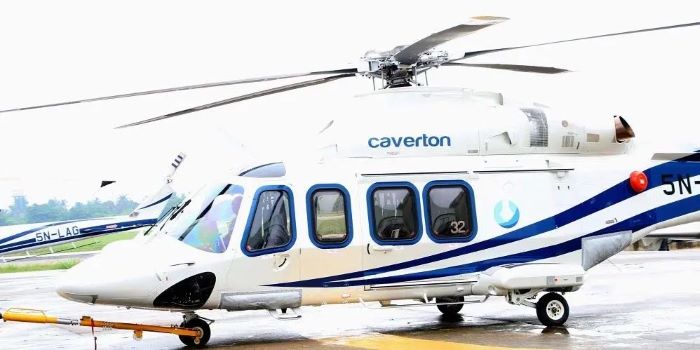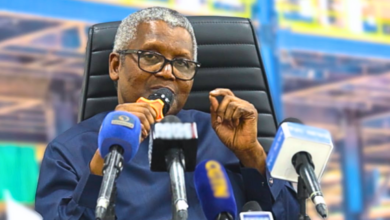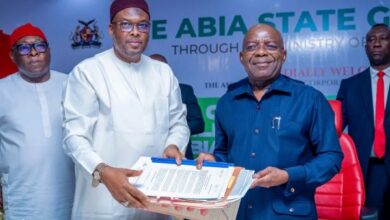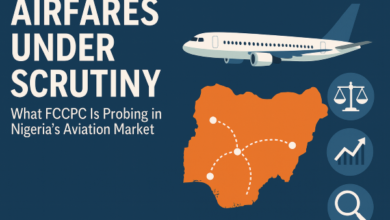Revenue: Why FG introduced helicopter landing levy – Keyamo
 The Ministry of Aviation and Aerospace Development, on Monday, said the introduction of helicopter landing levies was in line with global best practices and a cost recovery measure.
The Ministry of Aviation and Aerospace Development, on Monday, said the introduction of helicopter landing levies was in line with global best practices and a cost recovery measure.
This is contained in a statement by Mr Odutayo Oluseyi, Head, Press and Public Affairs of the ministry in Lagos.
According to Oluseyi, the ministry recognises the importance of helicopter operations in Nigeria’s aviation industry and is committed to implementing international best practices in helicopter operations.
He said that the helicopter landing levies were commonplace in countries such as the U.S., the United Kingdom, India and various other regions worldwide.
He maintained that Tallahassee International Airport in Florida began implementing helicopter landing levies under Vector Airport Systems, since Oct. 1, 2022.
Oluseyi said helicopter landing levies were common across airfields in the United Kingdom, ranging from major commercial ones, to small general aviation fields.
He added that, typically, helicopter levies, match or exceeded those for fixed-wing aircraft, varying based on factors like location and services provided.
“The Federal Government has granted NAEBI Dynamic Concepts Ltd., exclusive rights to collect helicopter landing levies in line with the MoU between NAEBI Concept and NAMA (focal Agency), Federal Airport Authority of Nigeria (FAAN) and the Nigeria Civil Aviation Authority (NCAA).
“It is instructive to note that NAMA, under the Act as amended in 2022, is empowered to collect aeronautical revenues in both the upper and lower airspace to support her self-sustainability.
“However, over the years, NAMA has predominantly relied on the upper airspace for her revenue generation.
“Government in her wisdom having discovered a lacuna on the lower airspace where helicopter operations is dominant, directed NAMA to live up to its responsibilities, to enable them generate enough resources.
“To sustain their aeronautical architecture, enhance security and surveillance and improve the overall quality of helicopter operations in Nigeria,” he said.
According to Oluseyi, the minimum is confident that the move will improve capacity, efficiency, safety, security and attract more investment in the aviation industry.
“We encourage all stakeholders to be committed to this laudable initiative, that has followed due processes and procedures and should embrace the new normal,” he said.
BRANDPOWER reports that the Minister, Mr Festus Keyamo, had recently given a directive to helicopter operators to grant total access to Messrs NAEBI Dynamic Concepts Ltd., for the collection of $300 levy.
The company was to collect the levies on behalf of the Federal Government, immediately.
Keyamo had said: “Non-compliance with this directive would constitute a breach of this mandate and would be met with appropriate sanctions,”.
Stakeholders react
But the decision by the Federal Government to appoint Messr NAEBI Dynamic Concept Limited to exclusively collect helicopter landing fees at all Nigerian aerodromes, helipads, airstrips, floating production storage and offloading (FPSO) units, floating storage and offloading (FSO) units and all platforms has continued to open a fresh controversy in the sector.
The landing charge is unknown to the law, and not regulated by the Nigerian Civil Aviation Authority (NCAA). Aircraft after take-off are expected to land except we expect them not to land.
But helicopter operators have vowed to resist the payment and threatened to ground their operations if the Federal Government insists that they must pay the landing fees.
Not only helicopter operators kicked against it, but many others with connection with aviation have raised posers over the new directive that could effectively hamper oil and gas operations should the helicopter operators make good their threat to down tools.
According to reports, in his first official visit to Lagos airport immediately after he assumed office, Keyamo was quaoted as saying: “We have been given a mandate to raise revenue for the government. Please, contact the advertising agencies so they can put up adverts on all these spaces. “We cannot have all these spaces and be talking about lack of funds. All details on your findings should be sent to me in seven days.”
To show the government’s desire to rake in more money through aviation, it directed parastatals classified as “super agencies” which are self-funded to remit 50 per cent of their Internally Generated Revenues (IGR) to the government coffers.
Aviation Metric however reports that aviation analysts and stakeholders have raised an alarm over the development which they said threatens the safety of the industry as agencies are expected to reinvest their surplus in safety-critical projects as recommended by the International Civil Aviation Organisation (ICAO).











